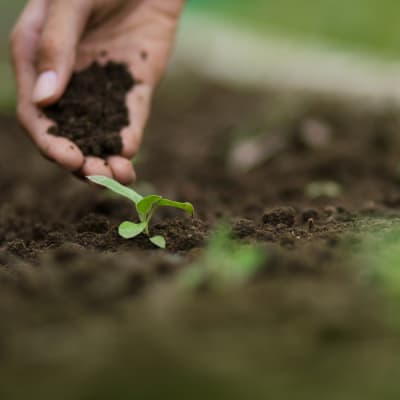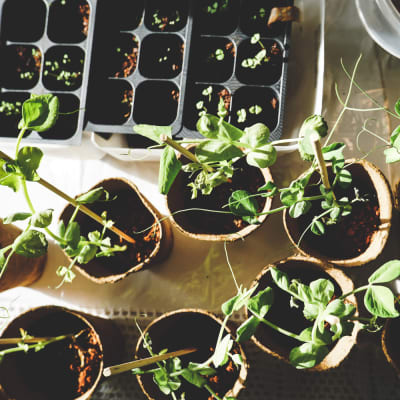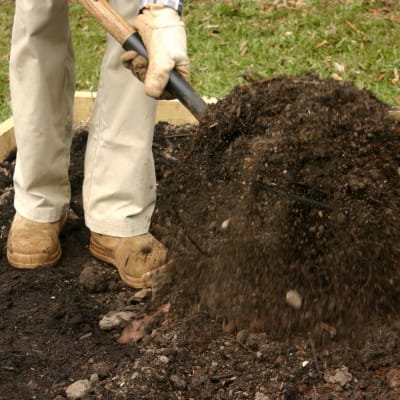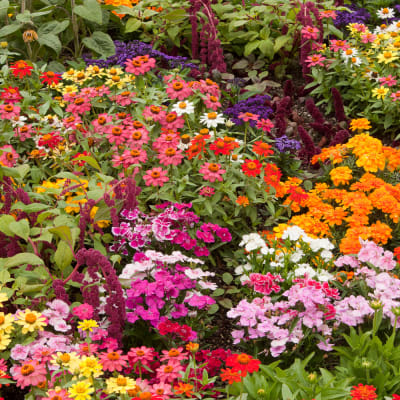Whether you have a lawn, garden or an entire pasture, composted chicken manure can be used as an effective, safe, low-cost fertilizer. This is a great alternative to chemical fertilizers, which can harm your health and environment in the long run. It’s full of nutrients that safely improve the health of your plants and lawn.
Chicken manure fertilizer can help your plants grow big and strong, but it also helps keep them healthy by adding organic matter and feeding soil microbes in the existing soil. We break down chicken manure fertilizer in our video below.
What is chicken manure fertilizer?
Chicken manure is a non-synthetic fertilizer that has several advantages. It's a comprehensive fertilizer, which means it contains high levels of primary nutrients: nitrogen, phosphorus and potassium. It also contains important micronutrients for plant and grass growth, like calcium, magnesium, copper and zinc.
In fact, chicken manure's nitrogen and phosphorous content is around twice the concentration of cow manure, or steer manure.
Chicken manure can be viewed not just as a rich fertilizer and plant food, but as a very beneficial soil amendment. It provides organic compounds that improve soil structure, moisture retention, drain capability and air circulation. This just means that in addition to fertilization, chicken manure can improve your lawn and garden soil for the long run.

Is using fresh chicken manure safe?
Short answer: no!
Let's get one thing straight—it is not okay to spread raw manure on your lawn or garden. Fresh chicken manure may contain disease organisms that could contaminate plants and grass. That means that if you have a chicken coop, you can't just take what's on the floor and put it on your plants as is.
Along with chicken manure, you scoop up a lot of other things in your coop bedding material, including feathers, straw, paper, grass clippings and more. This variety of components can lead to inconsistencies in the nutrient content of fresh manure.
That means that when using homemade manure fertilizer, you don't know exactly what you're putting on your plants! It's safer and more effective to use aged chicken manure rather than fresh poultry manure.
Industrially dried chicken manure fertilizer

Even better than aged manure is chicken manure fertilizer processed in an industrial dryer. That’s what we sell at Southland Organics. Our chicken manure fertilizer is processed in an industrial dryer heated to over 350 degrees and circulated with powerful blasts of air to make sure the final product is safe and optimal.
This industrial drying process renders the litter much better than composting ever could. The heated drying process removes weeds and pathogens while retaining all the beneficial nutrients litter can offer.
Composting alone is not good enough. With our industrially dried chicken manure fertilizer, you can rest assured that you’re applying a safe, effective natural fertilizer to your lawn and garden.
Check out our industrially processed chicken manure fertilizer here.

Our Chicken Manure Composting Process
The process for composting chicken manure safely involves a commercial dryer. This dryer has many industrial parts and components to move and heat the poultry manure. The poultry manure is ultimately heated to a temperature exceeding 350 degrees Fahrenheit. This extreme temperature is held for over a minute to ensure the killing of all harmful pathogens.
It is vital to destroy pathogens in the poultry manure. All organic matter, especially fresh chicken manure, contains harmful pathogens. By heating the manure above the thermophilic point (155 degrees), we are making sure that the process delivers a fully composted chicken manure that is still full of rich organic matter and available nitrogen and ammonia content.
Because our composted manure is heated to such high temperatures to destroy pathogens, it is perfectly safe to use in home gardens, children and pet play areas and most locations where other materials would be a concern.
How to Apply Chicken Manure Fertilizer

Applying chicken manure fertilizer is simple. Begin application of chicken manure fertilizer in the spring. Feed flowers and vegetables monthly throughout the growing season. Feed trees and shrubs in the spring and fall. For lawns, sprinkle on the soil surface as a side dressing and then water in.
Garden Fertilizer
Mix our chicken manure fertilizer into the top 4″ of soil at a rate of 5 lbs. per 100 sq. ft.
Flowers and Vegetables
Apply our chicken manure fertilizer at a rate of 2.5 tbsp per plant.
Trees & Shrubs
Apply 1 cup of our chicken manure fertilizer per foot of branch diameter around the drip line. Double this amount for plants larger than 3 feet in diameter.

Safety with Chicken Manure Fertilizer
Using chicken manure safely is imperative. The following safety tips are summarized from the Stewardship Gardening Program provided by Washington State University:
-
Apply only aged or composted manure to your soil.
-
Always wear gloves when handling livestock manure.
-
Thoroughly wash raw vegetables before eating.
-
Do not use cat, dog or pig manure in compost piles.
-
People who are susceptible to food borne illnesses should avoid eating uncooked vegetables from manured gardens. Those who face risks from food borne illness include pregnant women, very young children, and persons with cancer, kidney failure, liver disease, diabetes or AIDS.
Contact Us
If you have any questions about chicken manure fertilizer or our other products, shoot us an email at [email protected] or call us at 800-608-3755. If you have backyard chickens, check out our poultry products like Hen Helper and Big Ole Bird. Be sure to subscribe to get updated on our latest lawn and garden tips and tricks and product updates.








